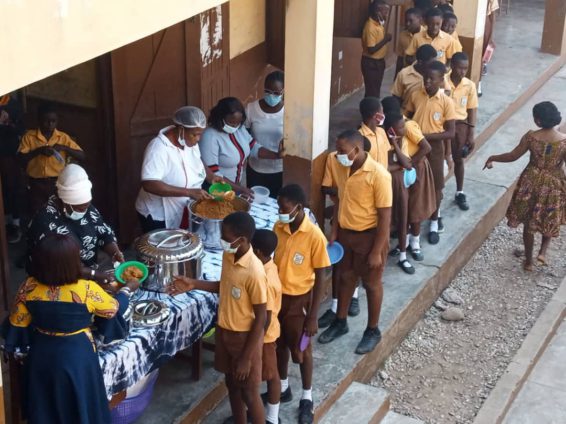
Audio By Carbonatix
A Medical Sociologist and Public Health Expert, Rev. Prof. Yaa Adobea Owusu, has said that the proposed amount of increment for meals provided under the School Feeding Programme is not enough to offer nutritious meals to the pupils.
Speaking on Upfront on JoyNews, she stated that one of the initial goals of the programme was to provide nutritious meals for the school children, adding that if they could not afford it at home, the school would be a place to eat well.
Prof Owusu noted that with the current economic crisis, GH¢1.20 is not enough for caterers to prepare nutritious meals.
“I think that we need to very much appreciate the jump the government has made from 97 pesewas to GHS1.20. That will be a huge jump especially also taking into cognizance our current situation. But when you look at the realities of how things sell in the market and the fact that these caterers also have to earn a living - they would be employing people - that money is still not enough to give nutritious food to the children.”
“I don’t think that given the present situation whether in rural or urban areas, that money although very much appreciated is able to deliver nutritious food for a child,” Prof Owusu added.
This comes after the government announced an increment of cost per meal, per child from 98 pesewas to ¢1.20.
The Minister for Gender and Social Protection, Lariba Zuweira Abudu, who announced this, said they are in talks with the Ministry of Finance to see how best the amount can be reviewed.
But the caterers have vehemently rejected the proposed increment noting that it is woefully inadequate to feed the children.
Speaking on Adom FM’s morning show, Dwaso Nsem on Tuesday, President of the School Feeding Caterers’ Association, Charlotte Asante, explained that the caterers are struggling to feed the pupils with good meals due to the hikes in the prices of food.
Meanwhile, Prof Owusu believes that the use of mostly imported products, which goes against one of the initial goals of the programme, has contributed to some of the challenges the programme is facing.
The public health expert indicated that, at the launch of the programme, 80% of the products used were expected to be sourced locally or within the communities.
“But, in the literature we just reviewed, right now we have less than 20% of the food that goes into school feeding coming from our local products. We see a lot of imports which doesn't help us, and it is far more expensive.”
She urged the government to review the programme and look into providing caterers with more locally produced goods. This, she said, would not only help in reducing cost, but also benefit farmers and other producers in the country.
Latest Stories
-
Ken Ofori-Atta’s case: Allow the legal process to work – Adutwum
8 minutes -
Don’t underestimate NPP delegates; they’re looking for someone who’ll win 2028 polls – Adutwum
19 minutes -
Catholic Bishops demand full audit of curriculum process over LGBTQ content in teacher’s manual
21 minutes -
Ghanaians want a new politics of ideas and solutions – Adutwum
31 minutes -
NPP race: I like to be underestimated; so nobody knows my strategy – Adutwum
35 minutes -
I am NPP’s best bet for 2028 victory – Adutwum
36 minutes -
NPP must choose a winner, not just a flagbearer – Adutwum
39 minutes -
I’m not politically weak – Adutwum dismisses claims of limited influence in NPP race
42 minutes -
NPP’s Adutwum praises gov’t for economic stabilisation, urges focus on sustainability
44 minutes -
Livestream: Newsfile discusses LGBTQ references in SHS manual, detains fugitives and home-bound developments
2 hours -
South Africa to showcase G20 legacy and investment-ready economy at World Economic Forum 2026
2 hours -
India to expand scholarship schemes for Ghana and other African countries
2 hours -
Karaga MP Dr Amin Adam upgrades basic school infrastructure, distributes 400 dual desks
4 hours -
Uganda’s president heads for victory as his main rival cries foul
4 hours -
Lt Col Dela Galley makes history as first female commander of Ghana Military Police
5 hours

